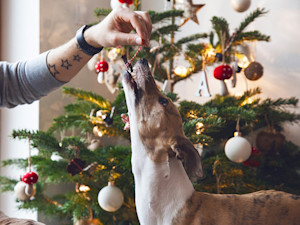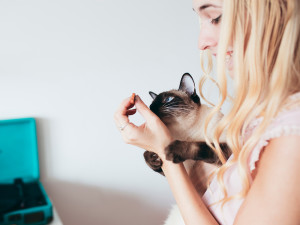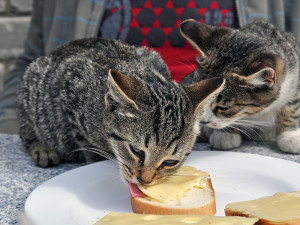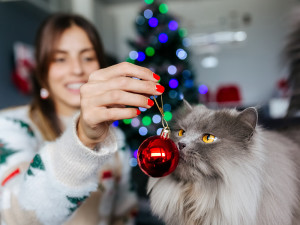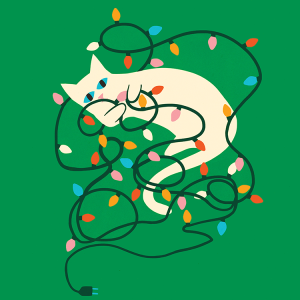Are Pine Needles Toxic to My Cat?
They smell great, but eating them, not so much.
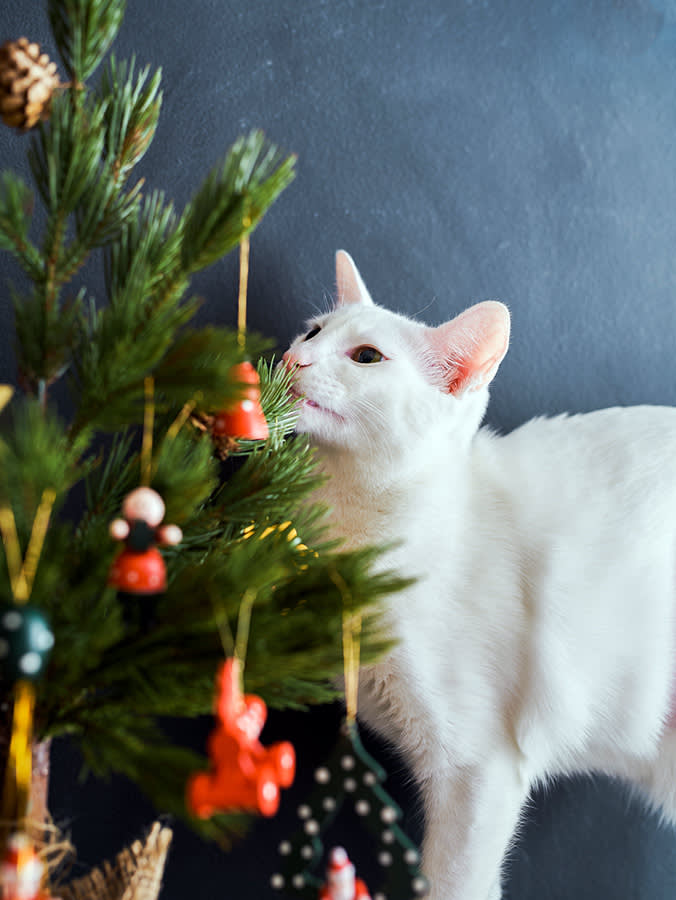
Share Article
Our cats have their own unique way of getting into the holiday spirit (clawing at ornaments, knocking down twinkling lights, etc). And in terms of seasonal treats, nine out of ten cats agree that there’s no better pastime than chewing at the Christmas tree. But is it safe for your cat to eat pine needles?
Short answer: No. Cats shouldn’t eat pine needles. In addition to being a choking hazard, pine needles contain a toxic oil that can cause gastrointestinal distress in cats. To find out more, we reached out to Dr. Lindsay Butzeropens in new tab for everything we need to know about keeping cats safe this holiday season.
Are pine needles toxic to my cat?
Yes, pine needles are toxic to cats. But like most toxins, the danger of pine needles ranges in severity. “Yes, pine needles can be toxic to cats. While the toxicity level is generally low, ingesting pine needles can cause gastrointestinal issues, such as vomiting, diarrhea, and abdominal pain,” Dr. Butzer tells Kinship.
Dr. Butzer adds that, in addition to their toxicity, those pointy needles present a physical hazard as well: “The sharp needles can potentially cause physical injury to your cat's mouth, throat, or intestines.”

Why are pine needles dangerous to cats?
Pine needles contain pine oil, which is toxic to cats. Cats lack a specific enzyme in their liver in order to metabolize the oil — this is also why essential oils pose a danger to cats. That means that pine oil isn’t just dangerous to cats who ingest it; diffused pine oil and pine oil that makes contact with fur or skin is also dangerous.
Keep in mind that this toxicity exists on a spectrum; larger quantities and higher concentrations are the most dangerous for your cat. And again, pine needles are pointy and not easily broken down by digestion, which means they are both a choking hazard and an internal puncture hazard.
What should I do if my cat has eaten pine needles?
If you witness or suspect your cat has eaten pine needles, stay calm and reach out to your vet. Most likely, your vet will have you monitor for symptoms of pine oil poisoning, such as tremors, drooling, vomiting, respiratory distress, low body temperature, low heart rate, and ataxia (wobbliness/unsteadiness). More serious cases of pine oil poisoning, usually as a result of larger amounts ingested, can result in liver failure.
Treatment for pine oil poisoning includes supportive veterinary care, such as IV fluid, stomach protectants, and pain medication. In the event that you can’t reach a vet’s physical office, a cat-specific first aid kit can come in handy; these are best used with guidance from a vet over phone or telehealth. Never use human medication on your cat, and do not attempt to induce vomiting. Essential oils are quickly absorbed, and your cat is unlikely to throw them up. Plus, inducing vomiting can cause dehydration or asphyxiation in your cat.
Diagnosing plant poisoning in cats
If your cat has access to pine needles, or you think they might have ingested some after interacting with the Christmas tree, inform your veterinary staff so they can put it on the list of possible causes for your cat’s symptoms.
Symptoms of plant poisoning in cats
Vomiting
Drooling
Diarrhea
Pain
Tremors
Difficulty breathing
Treatment
As Dr. Butzer says, the first thing you should do if your cat has eaten any amount of a pine needles is to call your veterinarian, who will advise you on the next steps to take. When your cat has eaten something that is toxic to them, never wait to call your vet or poison control hotline.
Cats who are showing persistent gastrointestinal symptoms could need help with their nausea or other issues. This could mean they require fluids and anti-nausea medications. Cats showing severe symptoms may need to be hospitalized.
How do I stop my cat from eating pine needles?
While your cat is probably a perfect genius, it is unlikely you will train them to stop eating pine needles — they’re a cat, after all. So, prevention is key when protecting cats from pine needles. If possible, keep pine Christmas trees in a room that your cat cannot access. Doing this will not only keep your cat safe from pine needles, but it will also keep your cat safe from other choking hazards, such as ornaments, tinsel, and lights.
If you are unable to keep your Christmas tree in a room away from your cats, there are still things you can do to keep your cat safe from pine needles. First, always clean up pine needles that have fallen off the tree. Then, set up a tall gate around your tree and place it in a cleared area without any furniture your cat could use to jump into the area. If that isn’t possible, consider placing aluminum foil, which many cats find unpleasant to walk on, around the base of your tree — a tip that might help deter your cats from your year-round houseplants as well.
What are some holiday plants that are safer than pine needles for cats?
Spruce and fir trees: These trees are safer than pine trees, but not entirely safe alternatives to pine trees. Their oils are still mildly toxic to cats, and their needles pose just as much danger as pine in terms of choking or intestinal distress. Make sure to still take precaution to keep your cat away from all types of needled Christmas trees.
Poinsettia: Surprisingly, the plant that sounds most like poison is one of the less toxic holiday plants, but that doesn’t make it an entirely safe option for your cat to munch on: “While their toxicity is often overestimated, ingesting poinsettia leaves or flowers can still cause gastrointestinal upset, such as vomiting and diarrhea, in cats,” Dr. Butzer advises. Again, Dr. Butzer stresses that being proactive is the best way to keep your cat safe. “While the toxicity is generally low, it’s best to keep all parts of the plant away from your cat to avoid any potential issues.”
Artificial trees: When in doubt, opt for the one type of tree that doesn’t produce any toxic essential oils. However, keep in mind that artificial tree needles still pose a choking and intestinal danger to cats. Continue to follow preventative measures if possible.
What are some other plants that are not safe for cats?
Holly and mistletoe: Turns out your tree isn’t the only plant you need to watch out for this Christmas. “Some other holiday plants, like holly and mistletoe, can be more toxic to cats [than pine needles],” Dr. Butzer tells Kinship.
“It’s essential to be cautious and keep all potentially toxic plants out of reach of your curious feline friends.” These plants and their berries can cause gastrointestinal, neurological, and cardiovascular issues in cats. Avoid keeping them in your home if at all possible.
How to prevent pine needle poisoning
The best way to prevent poisoning from pine needles is to keep your tree in an area where your cat can’t eat the needles — this might mean a closed bedroom or office space. Again, using a gate to block off the tree is another good option.
The bottom line: Are pine needles poisonous to my cat?
Pine needles are mildly toxic to your cat, in addition to being a choking and intestinal hazard. But it’s important not to panic if your cat ingests pine needles. The most common manifestation of pine needle toxicity is gastrointestinal distress with symptoms being vomiting, diarrhea, drooling, and lack of appetite. Dr. Butzer urges that you not wait for symptoms to manifest before seeking medical attention.
“If you suspect your cat has eaten pine needles, it's important to contact your veterinarian or an emergency animal clinic right away. They will provide guidance on the best course of action, which may include monitoring your cat for symptoms or bringing them in for an examination.”
FAQs (People also ask):
Can cats eat pine needles?
No, cats should not eat pine needles. Pine needles contain pine oil, an essential oil that is toxic to cats.
Are pine needles safe for cats?
Pine needles are not safe for cats; however, their toxicity exists on a spectrum. The more your cat eats, the more likely they are to have an adverse reaction.
Why do cats like pine needles?
Cats might be attracted to the scent of pine or enjoy the texture of chewing on the needles. Cats might also be attracted to your tree in general because of the many bells and baubles they can play with.

Rebecca Caplan
Rebecca Caplan is a writer based in Brooklyn whose work has been featured in The New Yorker, Reductress, and Vulture. She lives in Brooklyn with her perfect, toothless dog Moose.
Related articles
![Woman with tattoos eating noodles on the couch with her cat]()
Can Cats Eat Garlic?
It’s a human cooking staple, but your cat shouldn’t indulge.
![Blonde woman holding cat trying to feed it ham]()
Can Cats Eat Ham?
Skip the green eggs, but ham is OK — with a couple caveats.
![Two grey cats eating swiss cheese off of slices of bread while sitting on a table]()
You Should Not Invite Your Cat to Your Fancy Cheese Party
Save the charcuterie for the humans.
![A woman in a fun Christmas sweater with bright red nails holding a shiny red Christmas tree ornament in front of her grey cat]()
How to Stop Your Cat From Using Your Holiday Decorations to Torture You
There is a way to keep these holiday chaos demons at bay—here are some tips.
![illustration of cat playing with christmas lights]()
Holiday Safety Tips For Overly Festive Felines
Chances are, your cat is already plotting some Christmas chaos.


